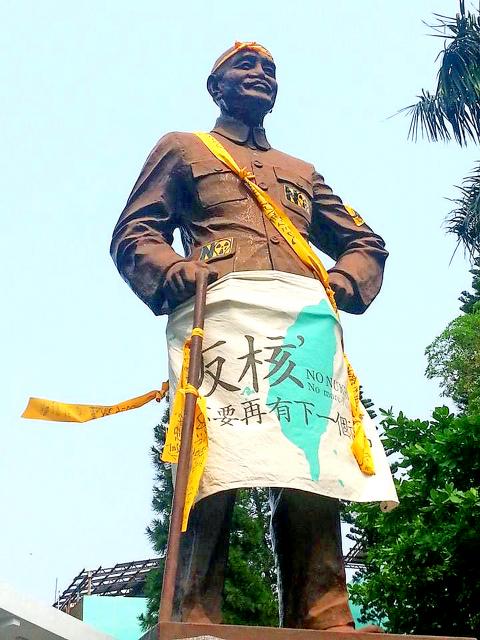A quarrel broke out between students and a “military instructor” this week at Fu Jen Catholic University in New Taipei City, where students initiated a campaign to remove a statue of Chiang Kai-shek (蔣介石) from the school grounds.
Leading the campaign were three law students who had designed stickers with the slogan “Support us to get rid of the poison residue of Chiang Kai-shek from campus” (無限期支持蔣介石遺毒滾出校園), a red slash on a picture of Chiang and “Get Out!” in English.
When the three students put the stickers on a campus statue of Chiang earlier this week, a man nearby began a heated argument and tried to detain the students.

Screengrab from National Kaohsiung Normal University’s Facebook page
One of the students filmed the incident and posted it online.
The angry man, surnamed Shang (尚), was the university’s military instructor.
Shouting, he called for the students to be arrested because they had broken school regulations by vandalizing public property.
“Who gave you the right to put stickers here? What you are doing is a criminal act,” Shang said.
Initially, the students refused to remove the stickers and retorted: “Why can we not put stickers here? Please tell us which school regulation we are violating.”
As the quarrel continued, Shang got more angry and shouted: “In my heart, Chiang Kai-shek is a great man.”
“I was a captain in the military police. I have also been a prison warden, so I know the kind of crime you have committed,” he added, demanding to know the students’ names, their identification numbers and other personal information.
The students finally gave Shang their names and other personal information, while complaining that his verbal threats and his attempts to keep them from the statue were offenses against their personal liberty.
The video was heatedly discussed by netizens.
“These military instructors are using their rank to oppress people. It felt like turning back the clock, to be living under martial law,” one netizen wrote.
“How can we still allow these officers, who have left or retired from the military, to continue such repression and abuse of students?” another wrote.
Some netizens said the students were wrong to “deface” the statue and had violated school regulations, while others insisted that all Chiang Kai-shek statues should be removed from all university campuses.
Fu Jen Catholic University director of public affairs Wu Chi-mei (吳紀美) denied Shang had called the police and asked them to arrest the students or taken any action to punish the students.
Wu said Shang did not mean any harm and he was just trying to stop school property being vandalized, adding that he had been in the job for one-and-a-half years and had not previously had any conflict with students.

An essay competition jointly organized by a local writing society and a publisher affiliated with the Chinese Communist Party (CCP) might have contravened the Act Governing Relations Between the People of the Taiwan Area and the Mainland Area (臺灣地區與大陸地區人民關係條例), the Mainland Affairs Council (MAC) said on Thursday. “In this case, the partner organization is clearly an agency under the CCP’s Fujian Provincial Committee,” MAC Deputy Minister and spokesperson Liang Wen-chieh (梁文傑) said at a news briefing in Taipei. “It also involves bringing Taiwanese students to China with all-expenses-paid arrangements to attend award ceremonies and camps,” Liang said. Those two “characteristics” are typically sufficient

A magnitude 5.9 earthquake that struck about 33km off the coast of Hualien City was the "main shock" in a series of quakes in the area, with aftershocks expected over the next three days, the Central Weather Administration (CWA) said yesterday. Prior to the magnitude 5.9 quake shaking most of Taiwan at 6:53pm yesterday, six other earthquakes stronger than a magnitude of 4, starting with a magnitude 5.5 quake at 6:09pm, occurred in the area. CWA Seismological Center Director Wu Chien-fu (吳健富) confirmed that the quakes were all part of the same series and that the magnitude 5.5 temblor was

The brilliant blue waters, thick foliage and bucolic atmosphere on this seemingly idyllic archipelago deep in the Pacific Ocean belie the key role it now plays in a titanic geopolitical struggle. Palau is again on the front line as China, and the US and its allies prepare their forces in an intensifying contest for control over the Asia-Pacific region. The democratic nation of just 17,000 people hosts US-controlled airstrips and soon-to-be-completed radar installations that the US military describes as “critical” to monitoring vast swathes of water and airspace. It is also a key piece of the second island chain, a string of

The Central Weather Administration has issued a heat alert for southeastern Taiwan, warning of temperatures as high as 36°C today, while alerting some coastal areas of strong winds later in the day. Kaohsiung’s Neimen District (內門) and Pingtung County’s Neipu Township (內埔) are under an orange heat alert, which warns of temperatures as high as 36°C for three consecutive days, the CWA said, citing southwest winds. The heat would also extend to Tainan’s Nansi (楠西) and Yujing (玉井) districts, as well as Pingtung’s Gaoshu (高樹), Yanpu (鹽埔) and Majia (瑪家) townships, it said, forecasting highs of up to 36°C in those areas